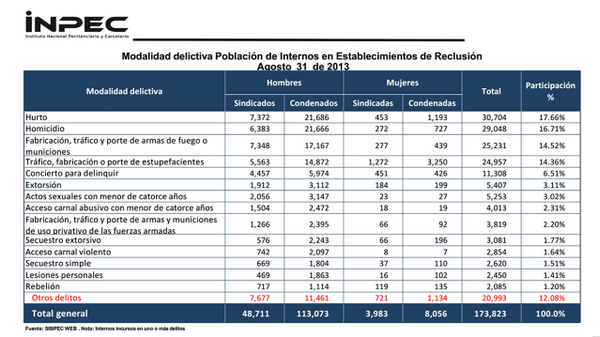Una auditoría de las prisiones colombianas halla una superpoblación extrema
Según un informe publicado por el Instituto Nacional Penitenciario y Carcelario de Colombia, el sistema de prisiones del país sufre una superpoblación del 53,3 por ciento. Más información, en inglés, está disponible abajo.
Suscríbase a las Alertas mensuales del IDPC para recibir información sobre cuestiones relacionadas con políticas sobre drogas.
Colombia’s jail system is overpopulated by 53.3 percent, according to a report released on October 1 by the National Institute for Jail and Prison Studies (INPEC). At present, the nation houses 117,037 inmates — 108,845 men and 8,192 women — 35.6 percent of whom have yet to be sentenced.
The problem of overcrowding in Colombian jails has been growing more visible, now backed up by the report’s data. On September 29, for example, more than 500 inmates were part of a hunger protest in El Pedregal, a prison in Medellín, to demand better sanitation facilities and more respect for their fundamental rights.
Rodrigo Ardila, a delegate and comptroller for Medellín has acknowledged the poor jail conditions, with one facility intended for 140 prisoners now holding 513: “There are not sufficient sanitation services. Halls with 250 people and only one bathroom. Other halls have only one or two bathrooms with one or two showers.”
Drug-trafficking crimes represent 15 percent of the incarcerated population in Colombia.Daniel Raisbeck, an historian and classics professor at Our Lady of the Rosary University in Bogotá, believes this presents an opportunity, since an end to drug prohibition would drastically reduce the number of crimes, and thus the number of people incarcerated.
Click here to read the full article.
Keep up-to-date with drug policy developments by subscribing to the IDPC Monthly Alert.
